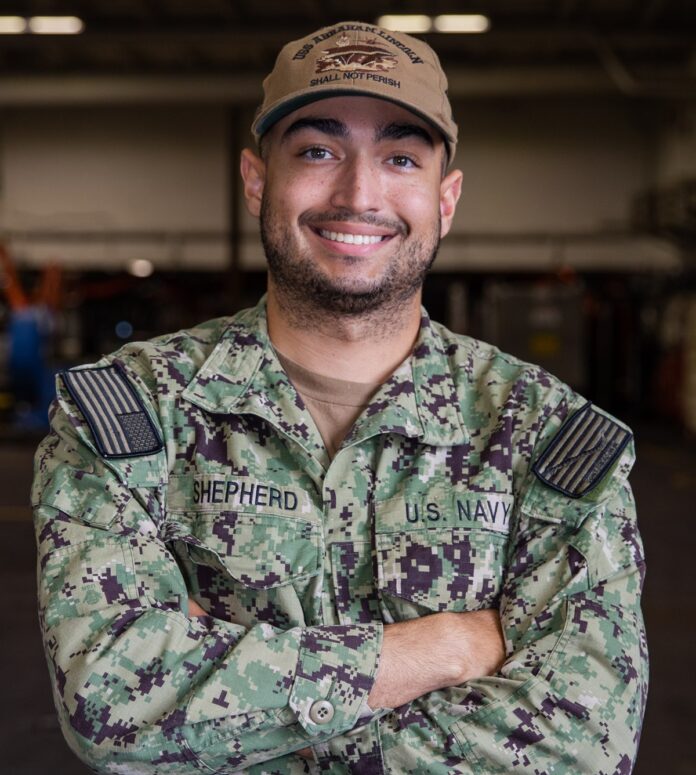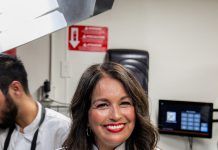By Mass Communication Specialist 1st Class Josiah Trombley, Navy Office of Community Outreach
Seaman Apprentice Zacariya Shepherd, a native of San Diego, California, is one of more than 5,000 sailors serving aboard the self-contained mobile airport, USS Abraham Lincoln.
Equipped with a full flight deck and more than 60 aircraft including attack fighter jets and helicopters, aircraft carriers are one of the largest warships in the world.
Shepherd is a 2018 Patrick Henry High School graduate who joined the Navy eight
months ago.
“I joined the Navy to explore the world and help out my future family,” said Shepherd. “I always wanted to travel and the Navy was a good start for my future family with housing and benefits.”
Skills and values learned in the Navy are similar to those found in San Diego.
“My hometown taught me a good work ethic since I worked long hours back at home,” said Shepherd.
Aircraft carriers are the centerpiece of America’s Naval forces. For more than 100 years, they have projected power, sustained sea control, bolstered deterrence, provided humanitarian assistance and disaster relief, and maintained enduring commitments worldwide.
According to Navy officials, aircraft carriers are versatile and have unique mission capabilities that make them a more strategic asset for the Navy than fixed-site bases. They are often the first response in a global crisis because of their ability to operate freely in international waters anywhere on the world’s ocean. In addition, no other weapon system can deploy and operate forward with a full-sized, nuclear-powered aircraft carrier’s speed, endurance, agility and the combat capability of its air wing.
“Sailors are truly the most valuable asset on USS Abraham Lincoln,” said Capt. Pete Riebe, commanding officer of USS Abraham Lincoln. “The crew has been working hard preparing the ship for deployment since I took command and I can’t wait to take the team to sea so that I can see these warfighters in action.”
This year commemorates 50 years of women flying in the U.S. Navy. In 1973, the first eight women began flight school in Pensacola. One year later six of them, known as “The First Six,” earned their “Wings of Gold.” Over the past 50 years, the Navy has expanded its roles for women to lead and serve globally, and today women aviators project power from the sea in every type of Navy, Marine Corps, and Coast Guard aircraft.
According to Navy officials, our Nation and our Navy is stronger because of their service. With 90 percent of global commerce traveling by sea and access to the internet relying on the security of undersea fiber optic cables, Navy officials continue to emphasize that the prosperity of the United States is directly linked to trained sailors and a strong Navy.
As a member of the Navy, Shepherd is part of a world-class organization focused on maintaining maritime dominance, strengthening partnerships, increasing competitive warfighting capabilities and sustaining combat-ready forces in support of the National Defense Strategy.
“The Navy contributes to national defense by being able to bring supplies anywhere in the world,” said Shepherd. “Usually we carry anything from merchant supplies, medical supplies and emergency supplies around the world to countries that need it. We can travel around the world to different ports and bring in business when sailors go to various ports.”
Shepherd has many opportunities to achieve accomplishments during military service.
“My proudest achievement has been being a part of something bigger than myself,” said Shepherd. “Instead of staying in one place, I am around different ports around the country and the world making a difference in any way that I can.”
As Shepherd and other sailors continue to perform missions, they take pride in serving their country in the United States Navy.
“Serving in the Navy means to protect the ones that I love and those around the world,” said Shepherd.
Shepherd is grateful to others for helping make a Navy career possible.
“I would like to thank my cousin, Sam,” said Shepherd. “He is the one who would help me out with construction work and get used to getting a good work ethic. I want to thank all of my family for their constant support of me. I want to thank Specialist Apprentice Sasha Hoffman for being able to help each other out during tough times. We went through boot camp and ‘A’ school at the same time and are now at the same command together. We’ve been able to provide emotional support to each other.”
“I would like to thank my Chain of Command for being understanding and helpful,” added Shepherd. “They treat me more like a person and not like a cog in the machine.”














